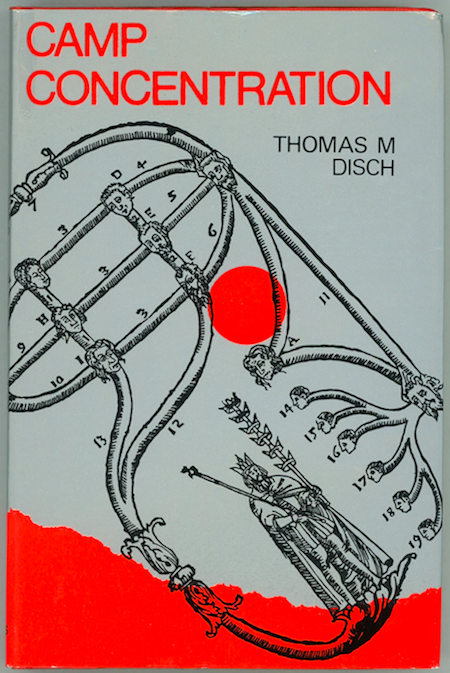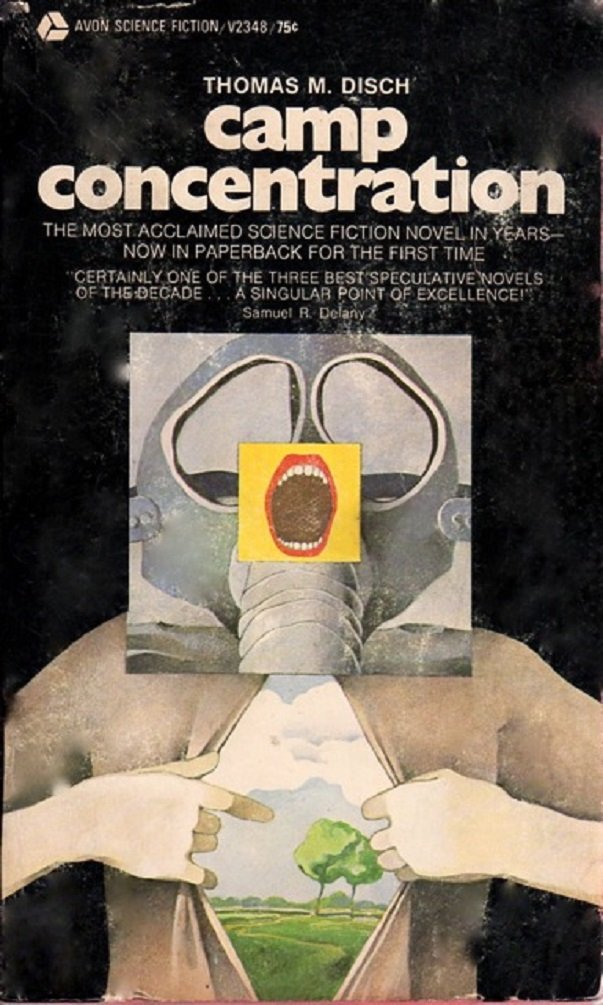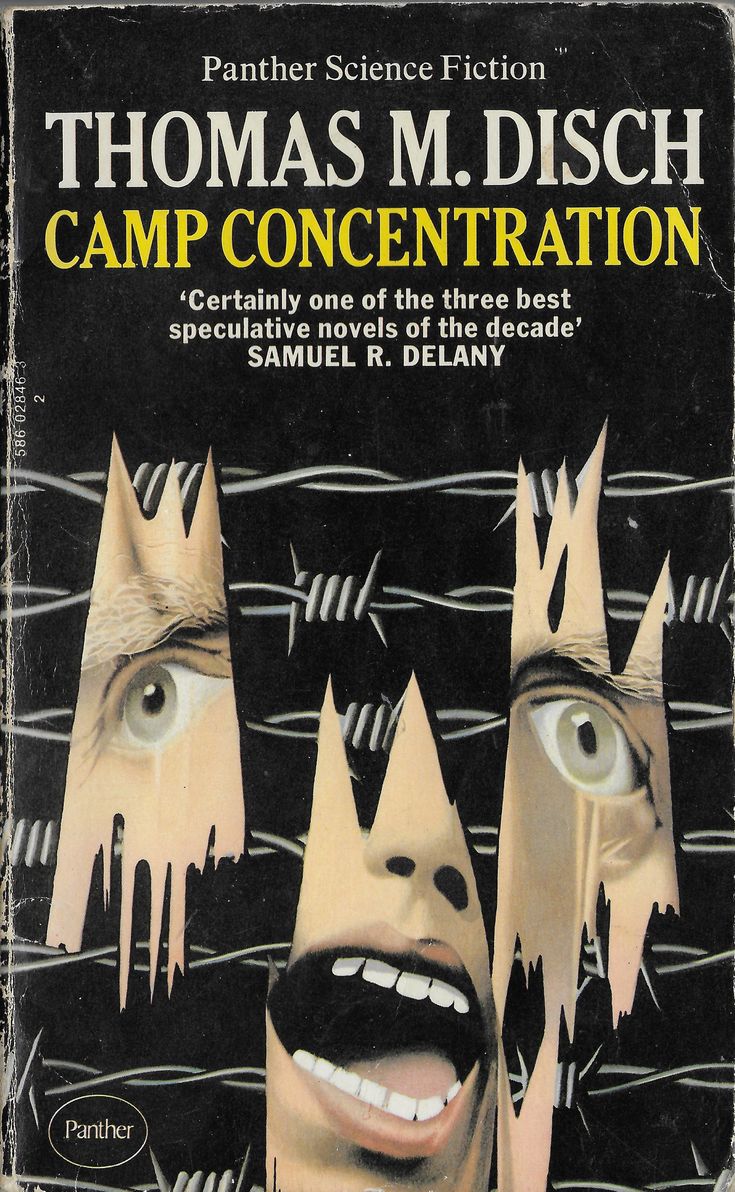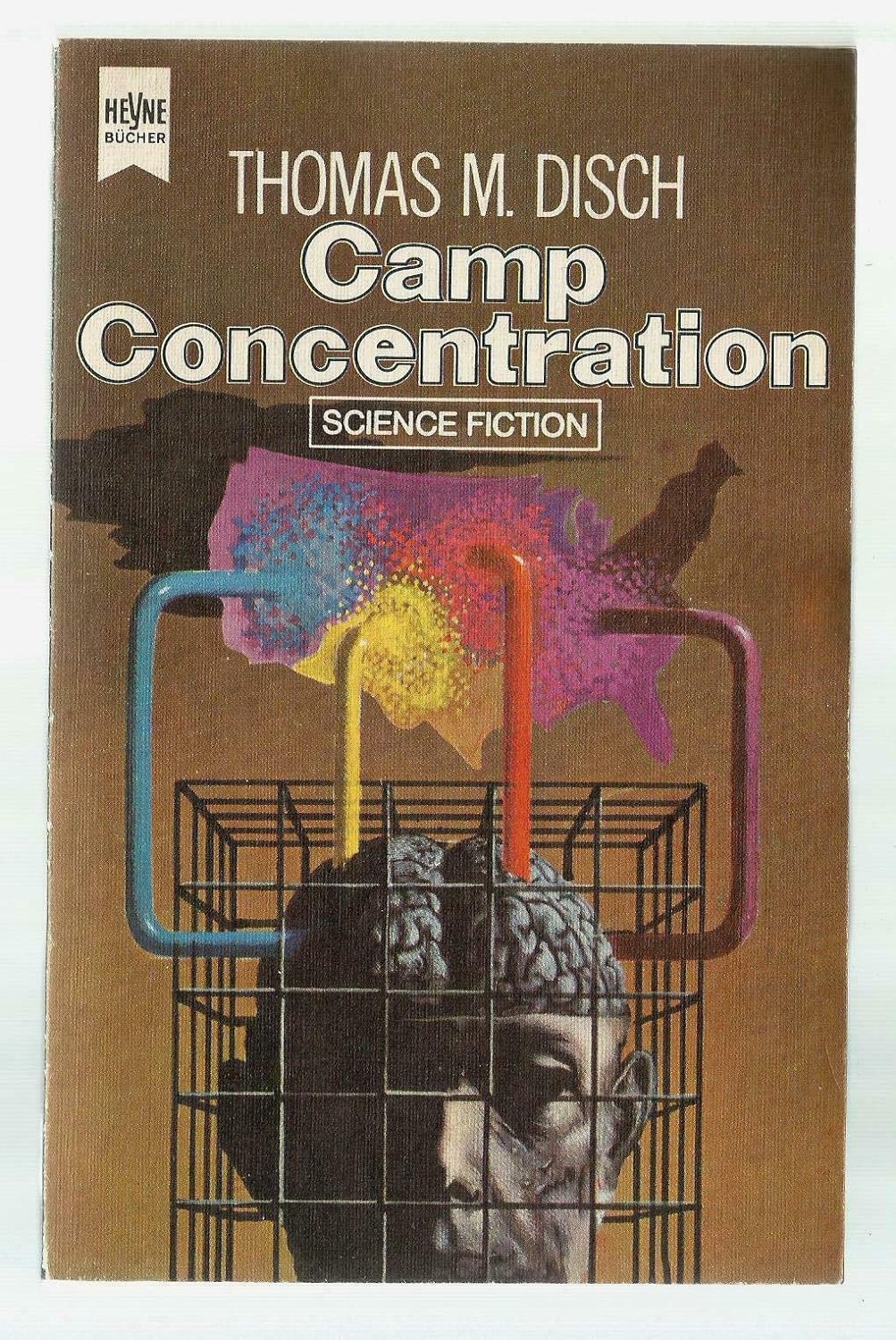SEMIOPUNK (12)
By:
February 9, 2024
An irregular, ongoing series of posts dedicated to surfacing examples (and predecessors) of the sf subgenre that HILOBROW was the first to name “semiopunk.”
THE GLASS BEAD GAME | FLATLAND | THE HAMPDENSHIRE WONDER | EXPLOITS AND OPINIONS OF DR. FAUSTROLL, PATAPHYSICIAN | A VOYAGE TO ARCTURUS | THE MAN WITH SIX SENSES | THE SPACE MERCHANTS | ODD JOHN | TIME OUT OF JOINT | THE SOFT MACHINE | SOLARIS | CAMP CONCENTRATION | CAT’S CRADLE | FRIDAY | BABEL-17 | RIDDLEY WALKER | ENGINE SUMMER | LE GARAGE HERMÉTIQUE | VALIS | RODERICK | PATTERN RECOGNITION | THE PLAYER OF GAMES | A CANTICLE FOR LEIBOWITZ | SNOW CRASH | VURT | FEERSUM ENDJINN | DOOM PATROL | THE THREE STIGMATA OF PALMER ELDRITCH | THE EINSTEIN INTERSECTION | LORD OF LIGHT | UBIK | GRAVITY’S RAINBOW | COSMONAUT KEEP | NINEFOX GAMBIT | THE MOUNTAIN IN THE SEA | BABEL | EMBASSYTOWN | CAPACITY | GLASSHOUSE | THE DIFFERENT GIRL.
CAMP CONCENTRATION
In an authoritarian near-future America, President Robert McNamara — Secretary of Defense, at the time Disch was writing — has embroiled the country in an illegal war… no longer just against Vietnam (and by extension, the USSR) but against third-world guerrillas around the entire planet. Thomas M. Disch’s Camp Concentration (1968) is written as the Dostoyevskyan prison diary of one Louis Sacchetti, a conscientious objector to this world war.
Sacchetti, a poet (loosely modeled on the poet Robert Lowell, who spent time in a sanitorium), has been sent to Camp Archimedes, an underground military establishment in the midwest — the inmates of which are dosed (unwittingly) with a new drug (pallidine — developed from an isolated strain of syphilis) as part of a military experiment. Camp Archimedes is a Foucauldian prison-clinic-facility; psychology, Sacchetti will declare at one point, is the Inquisition of our age. One is reminded of the 1967–1968 TV show The Prisoner; in fact, Disch would write the only Prisoner tie-in novel.
The pallidine treatment increases the unwitting subjects’ memory, insight, and intelligence, while shortening their lives to nine months. Sacchetti’s job is to record what happens, for the camp’s warden.
Sanchetti’s life as a poet comes gushing out in a flood of literary allusion, classical references, and angled commentary on the life of the “infected” prisoners around him. A young man named Mordecai proves the most thought provoking. Dabbling in multiple languages, alchemy, astrology, and even writing and staging his own plays, Mordecai introduces Sanchetti to the mindset of a person with so little time remaining yet with so much brain power to put to purposes previously only dreamed of.
— review from Speculiction
Mordecai — an African American character who goes from nearly illiterate to a fount of knowledge on all Western culture within six months — is a sort of Mephistopheles to Sacchetti’s Faust. (At one point the prisoners stage Christopher Marlowe’s Doctor Faustus.)* Mordecai becomes preoccupied with alchemy, to Sacchetti’s initial puzzlement. But Mordecai is streetwise in addition to brilliant… he’s up to something.
* Camp Concentration is meta-textual — referencing not only the Faust legend but Thomas Mann’s Doktor Faustus (1947), which was itself a re-shaping of the Faust legend. Here, a composer (loosely based on Schoenberg, by way of Adorno’s theories about atonal music) intentionally contracts syphilis… which deepens his artistic inspiration through madness. (Disch’s novel is dedicated to John Sladek and Thomas Mann.)

“Thought itself is a disease of the brain,” we read at one point. Creativity is a disintegrative process, against which the mind defends itself by solidifying once-flexible notions into systems. By breaking down rigid categories in the mind, the disease makes the thought process both faster and more flexible.
Does God exist? Does alchemy work? Do we humans create Hell for ourselves? If genius is a matter of breaking down the mind’s rigid categories, then are all geniuses insane?
Sacchetti, an erudite wordsmith and deep thinker, has much to say on these and other topics… particularly as his own mind’s rigid categories begin to break down. Tough supposedly not part of the experiment, he becomes manic — a faster worker, a faster reader, a faster meaning-parser. His prose begins to sound like this:
Without science we wouldn’t have these rows of uprisen stelae. It (science) is a veil over open lips, it is the word unspoken. Even the damned are reverent at that alter.
— from Sacchetti’s journal
We’re along for the ride as an ordinary person becomes a “genius,” which is to say — we watch as seemingly natural, eternal, and inevitable structures of meaning and differentiation begin to dissolve in the narrator’s mind. The seemingly natural is revealed as arbitrary. These are the sorts of insights offered by semiotics, as well — and the danger of semiotics is also signaled here. One can go too far.
In Part II, after a test run on the prisoners, a megalomaniac nuclear physicist has himself injected with the disease, joins Camp Archimedes with his team of student helpers, and sets about trying to end the human race. Ultimately, it transpires, palladine cannot be contained.
(Stanislaw Lem, in a post-script to his essay “On the structural analysis of science fiction,” would pan this business as the novel’s “totally unnecessary end-game.”)
In 1972, Philip K. Dick would write a paranoid letter to the FBI suggesting that there were coded messages in Camp Concentration. (But Dick would also say, in an interview, that when he finished Camp Concentration, “I was different, and I think this is what I would define as a mature work” ‚ i.e., a novel that forever alters its readers.)
PS: With Ignatius J. Reilly, with whom he shares the qualities of being highly educated, Catholic, and rather unlikeable, Sacchetti is one of the great obese fictional characters. He has a number of ironic visions involving other obese historical and intellectual figures, including Thomas Aquinas.
PPS: The novel was first serialized in the British New Wave sf magazine New Worlds in 1967, edited by Michael Moorcock; Disch was an American expat. In 2009, Moorcock would include the book on a list of his six favorite dystopias, written for The Guardian: “This beautifully written vision of hell, full of literary references, is science fiction at its best.”
JOSH GLENN’S *BEST ADVENTURES* LISTS: BEST 250 ADVENTURES OF THE 20TH CENTURY | 100 BEST OUGHTS ADVENTURES | 100 BEST RADIUM AGE (PROTO-)SCI-FI ADVENTURES | 100 BEST TEENS ADVENTURES | 100 BEST TWENTIES ADVENTURES | 100 BEST THIRTIES ADVENTURES | 75 BEST GOLDEN AGE SCI-FI ADVENTURES | 100 BEST FORTIES ADVENTURES | 100 BEST FIFTIES ADVENTURES | 100 BEST SIXTIES ADVENTURES | 75 BEST NEW WAVE SCI FI ADVENTURES | 100 BEST SEVENTIES ADVENTURES | 100 BEST EIGHTIES ADVENTURES | 75 BEST DIAMOND AGE SCI-FI ADVENTURES | 100 BEST NINETIES ADVENTURES | 75 BEST HADRON AGE SCI-FI ADVENTURES.



